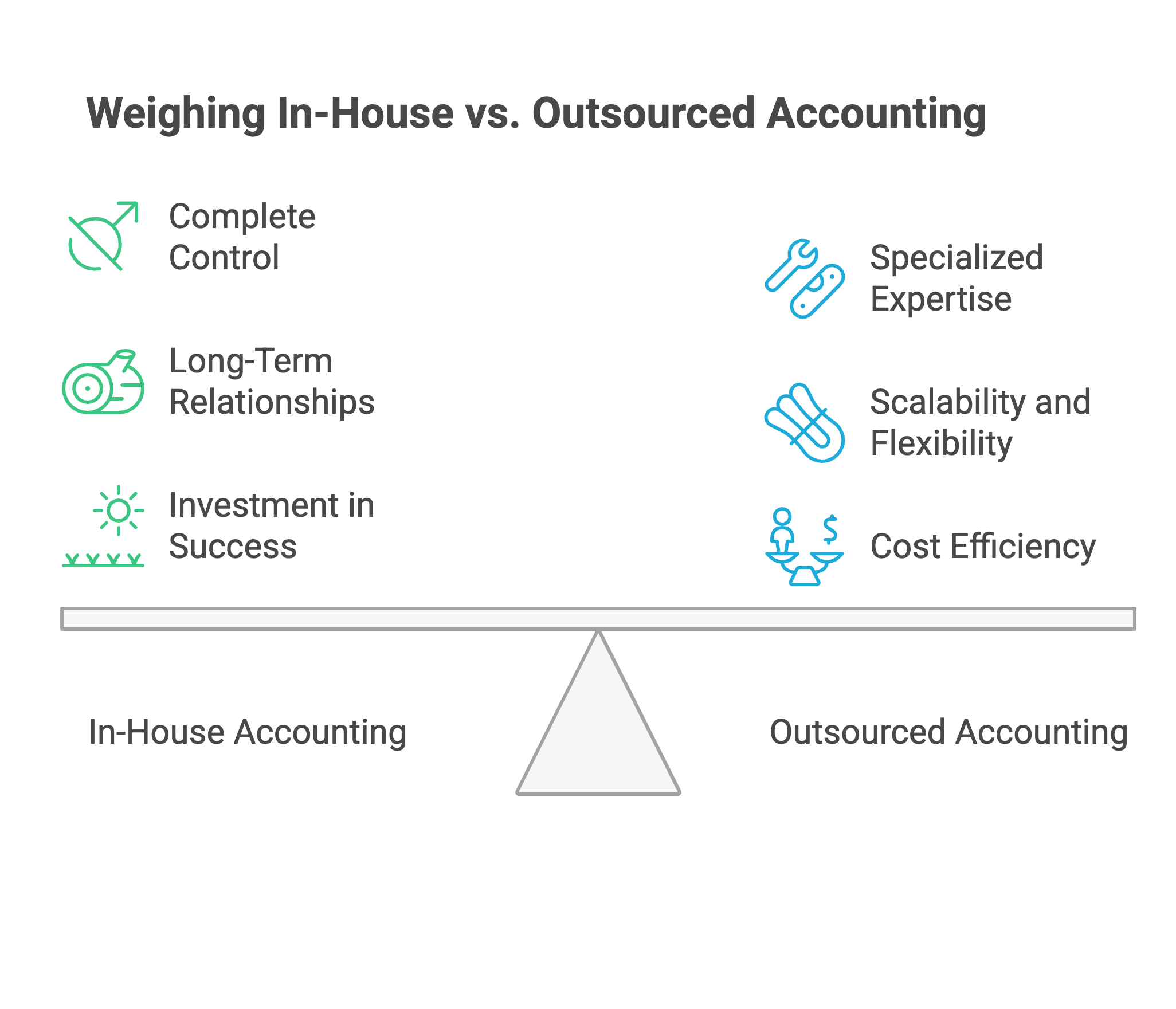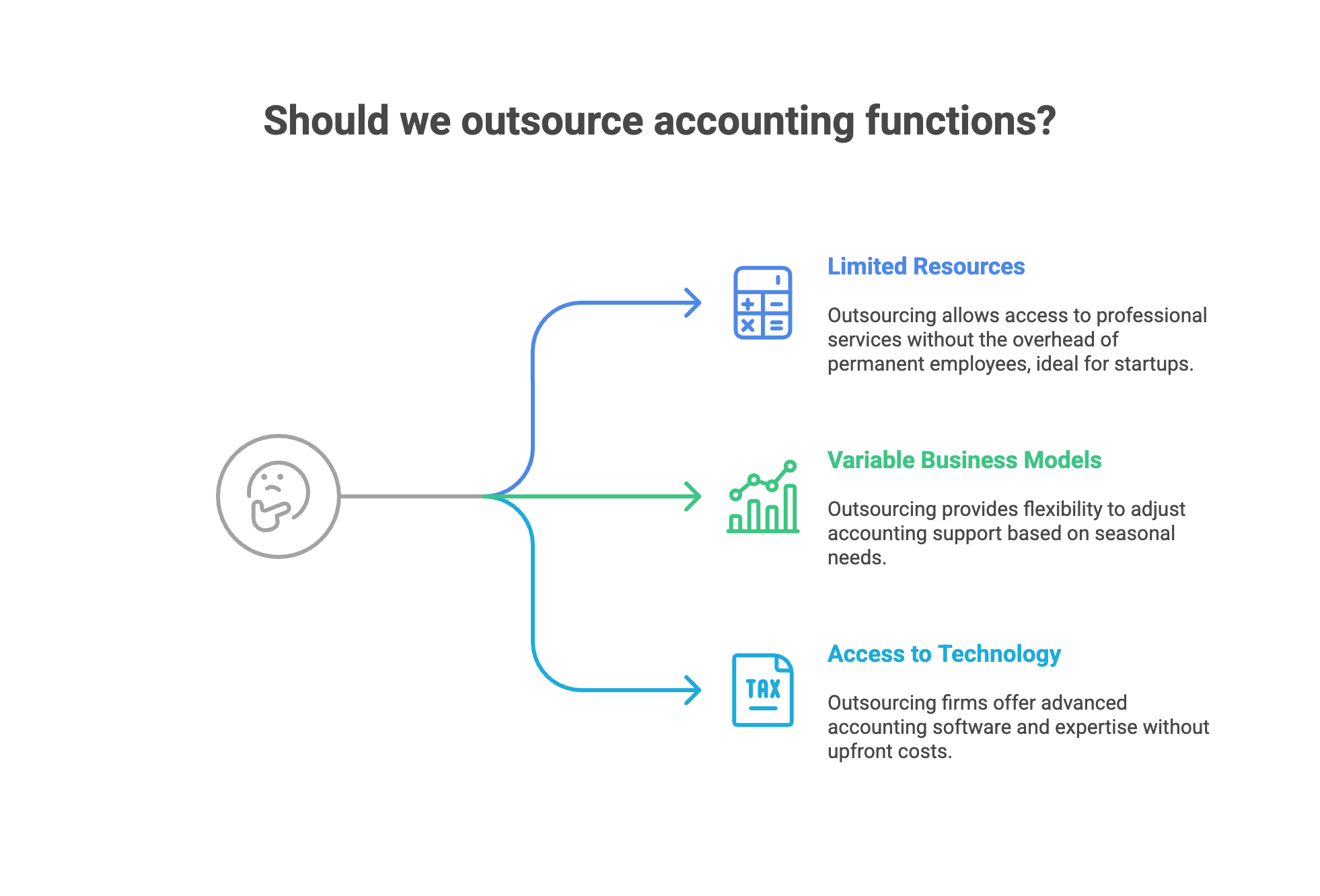Running a business means making countless decisions that impact your bottom line, and one of the most important is how to handle your accounting needs. You're probably asking yourself: should I hire an in-house accountant or outsource my accounting functions to external professionals? This decision affects not just your budget, but also the quality of your financial management and your ability to scale your business effectively.
The truth is, there's no universal answer because every business has unique needs, resources, and goals. What works perfectly for a growing startup might be completely wrong for an established company, and vice versa. Let's break down the real differences between in-house accounting vs outsourcing so you can make the choice that actually makes sense for your business.
When you're weighing your options for handling accounting tasks, you're essentially choosing between two fundamental approaches. In-house accounting means hiring dedicated staff who work exclusively for your company, becoming part of your internal team and handling all your financial management needs from within your organization.
On the flip side, outsourcing accounting involves delegating accounting tasks to external professionals or accounting firms who serve multiple clients. These outsourced services provide expertise and support without the commitment of permanent employees on your payroll.
Both approaches have their place in the business world, and the right choice depends on factors like your company size, budget, growth trajectory, and the complexity of your financial operations. Understanding these differences helps you make an informed decision that supports your business goals.
When you hire an in-house accountant, you get someone who's completely focused on your business. This internal team member understands your company culture, knows your specific processes, and can provide immediate responses to financial questions or urgent needs.
In-house accounting allows for seamless integration with your daily operations. Your accountant can attend meetings, participate in strategic planning, and provide real-time insights that help guide business decisions. This level of involvement often leads to deeper understanding of your business model and more tailored financial strategies.
Having an internal accountant also means maintaining direct control over your financial data and processes. You set the priorities, determine the focus areas, and ensure that sensitive information stays within your organization.
An in-house accounting team builds institutional knowledge over time. They understand your business cycles, know your vendor relationships, and can spot unusual patterns or opportunities that outsiders might miss. This accumulated knowledge becomes increasingly valuable as your business grows and evolves.
The continuity of having the same person or team handling your accounting creates consistency in reporting, processes, and financial management approaches. This stability can be particularly valuable for businesses with complex operations or those in highly regulated industries.
In-house staff have a direct stake in your company's success. Their job security and advancement opportunities depend on your business performance, which can create strong motivation to deliver exceptional results and contribute to growth initiatives.
This alignment of interests often translates into proactive problem-solving, innovative cost-saving ideas, and a willingness to go above and beyond during busy periods or challenging times.
Outsourced accounting firms often provide access to specialized skills and knowledge that would be expensive or difficult to maintain in-house. These firms invest in ongoing training, advanced accounting software and technology, and stay current with changing tax laws and regulations.
When you outsource your accounting, you're essentially getting a team of professionals with diverse expertise for the cost of what might be a single in-house hire. This is particularly valuable for complex accounting needs or specialized requirements like multi-state tax compliance.
One of the biggest advantages of outsourcing vs maintaining an in-house team is the ability to easily scale your accounting support based on business needs. During busy periods like tax season or end-of-year closing, outsourced services can provide additional resources without the challenges of hiring temporary staff.
Similarly, if your business experiences seasonal fluctuations or varying workloads, outsourced staffing allows you to scale services up or down without the fixed costs of permanent employees.
Outsourcing provides cost savings by eliminating the overhead associated with full-time employees. You avoid costs like benefits, payroll taxes, office space, equipment, and accounting software licenses. Instead, you pay for the specific services you need when you need them.
This approach also provides more predictable monthly expenses, making budgeting easier and reducing the financial risk associated with hiring and potentially having to terminate employees if business conditions change.

If your business has complex financial operations that require constant monitoring and immediate attention, hiring in-house might be the better choice. Companies with multiple revenue streams, complex inventory management, or frequent transactions often benefit from dedicated internal support.
In-house accounting teams can provide the immediate responsiveness that complex operations demand. When issues arise or decisions need quick financial input, having someone on-site who understands your business intimately can be invaluable.
Businesses with consistent revenue and strong growth trajectories can often justify the investment in in-house accounting staff. When you have the financial stability to support permanent employees and the workload to keep them busy full-time, in-house teams become cost-effective.
Established companies with predictable accounting needs and sufficient volume of transactions often find that maintaining an in-house team provides better value than paying for external services on an ongoing basis.
If you need your accounting professional to be deeply involved in strategic planning, business development, or operational decision-making, an in-house accountant might be more appropriate. This level of strategic involvement requires the kind of deep business understanding that develops over time with dedicated focus.
Small businesses and startups often lack the resources to hire qualified in-house accounting staff without straining their budgets. Outsourcing provides access to professional accounting services without the overhead of permanent employees, making it ideal for businesses in their early growth stages.
This approach allows you to invest your limited resources in core business activities like product development, marketing, or sales while still maintaining professional financial management.
If your business has significant seasonal fluctuations or variable workloads, outsourced services provide the flexibility to match accounting support to actual needs. You're not paying for full-time staff during slow periods, and you can increase support during busy times.
Outsourcing companies understand these patterns and can efficiently manage resources across multiple clients with different peak periods, providing cost-effective solutions for businesses with irregular needs.
Outsourced accounting firms invest in the latest accounting software and technology, providing access to tools that might be too expensive for individual businesses to purchase and maintain. They also employ specialists in various areas like tax planning, compliance, and financial analysis.
This access to advanced capabilities and specialized knowledge can significantly improve the quality of your financial management without requiring large upfront investments in technology or training.

Consider both your immediate accounting requirements and your anticipated growth trajectory. A solution that works today might not be appropriate as your business evolves, so think about scalability and flexibility in your decision-making process.
Assess the complexity of your accounting needs, the volume of transactions you process, and the level of strategic financial input you require. These factors will help guide you toward the approach that provides the best value for your specific situation.
Look beyond the obvious costs to understand the total investment required for each approach. In-house accounting involves salary, benefits, training, equipment, and software costs. Outsourcing has service fees but eliminates most overhead expenses.
Consider the opportunity cost of your time and attention as well. Managing in-house staff requires time for hiring, training, supervision, and performance management that could be spent on core business activities.
Think about business continuity and risk management in your decision. In-house staff can leave unexpectedly, creating disruption and knowledge gaps. Outsourced services typically provide backup coverage and continuity that reduces business risk.
However, outsourcing also creates dependency on external providers, which introduces different types of risk that need to be considered and managed appropriately.
Some businesses find success with hybrid solutions that combine elements of both in-house and outsourced accounting. This might involve maintaining basic in-house capabilities while outsourcing specialized functions like tax preparation or financial analysis.
Hybrid approaches can provide the benefits of both models while minimizing their respective drawbacks. You maintain internal control and immediate access while gaining specialized expertise and cost efficiency where it makes sense.
Remember that your accounting solution can evolve as your business grows and changes. Many companies start with outsourced services and transition to in-house teams as they scale, or vice versa based on changing needs and circumstances.
The key is choosing a solution that serves your current needs effectively while maintaining flexibility for future changes. Avoid making decisions that lock you into approaches that might not serve your long-term interests.
What's the main difference between accounting staffing and in-house accounting?
Accounting staffing involves outsourcing financial tasks to external professionals or firms, while in-house accounting means hiring dedicated employees who work exclusively for your company. The choice affects cost, control, expertise access, and scalability.
How much can I save by outsourcing vs hiring an in-house accountant?
Outsourcing typically saves 30-50% compared to in-house hiring when you factor in salary, benefits, training, and overhead costs. However, savings depend on your specific needs, business size, and the level of services required.
When should a business consider switching from outsourced to in-house accounting?
Consider switching to in-house when you have consistent revenue to support permanent staff, complex operations requiring constant attention, sufficient transaction volume to justify full-time positions, or need deep strategic financial involvement.
What are the risks of outsourcing accounting functions?
Main risks include less direct control over processes, potential data security concerns, dependency on external providers, and possible communication challenges. However, reputable firms have systems to minimize these risks effectively.
Can I combine both in-house and outsourced accounting services?
Yes, hybrid approaches are common and effective. You might maintain basic in-house bookkeeping while outsourcing specialized functions like tax preparation, payroll processing, or financial analysis to get benefits of both models.
How do I choose the right accounting solution for my business size?
Small businesses often benefit from outsourcing due to cost efficiency and access to expertise. Medium businesses might use hybrid approaches. Large companies typically need in-house teams for complex operations, though they may outsource specialized functions.
What should I look for when evaluating outsourced accounting firms?
Key factors include relevant industry experience, technology capabilities, security measures, communication processes, scalability options, references from similar businesses, and transparent pricing structures that align with your needs.
How quickly can I switch between in-house and outsourced accounting?
Switching typically takes 2-6 months depending on complexity. Moving from in-house to outsourced is usually faster than the reverse, which requires hiring and training. Plan transitions carefully to avoid disruption to financial operations.
Choosing between accounting staffing and in-house solutions isn't just about cost; it's about finding the approach that best supports your business goals, growth trajectory, and operational needs. Whether you decide to hire an in-house team, outsource your accounting functions, or create a hybrid solution, the key is making an informed decision based on your specific circumstances rather than following what others do. Take time to evaluate your real needs, consider both current and future requirements, and choose the path that provides the best foundation for your business success.

A practical comparison of hiring a freelancer vs using a dedicated offshore accounting team, focusing on continuity, quality control, security, and scaling.

How CPA firms outsource payroll and 1099 work to reduce penalties and admin load, with a clean workflow for approvals, filings, and year-end reporting.

Practical do's and don'ts for CPA firms outsourcing accounting work, based on common failure points and what successful rollouts do differently.